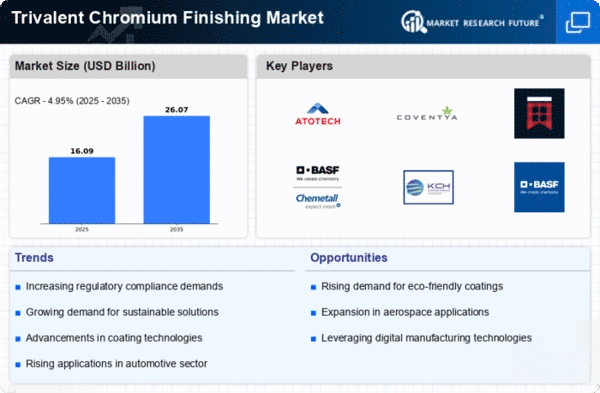Market Trends
Key Emerging Trends in the Trivalent Chromium Finishing Market
Hexavalent chromium plating, once a staple in protective coatings for applications in automotive, aerospace, and industrial sectors, has encountered significant restrictions in recent years. Regulatory bodies such as the Occupational Safety and Health Administration (OSHA) and the Environmental Protection Agency (EPA) have imposed stringent guidelines due to the inherent dangers associated with hexavalent chromium, prompting a reevaluation of its usage.
Hexavalent chromium ions, a key component in traditional plating solutions, are notorious for their high toxicity. Prolonged exposure to hexavalent chromium can lead to severe health hazards, including skin ulcers and the dissolution of mucous membranes. The US government has classified hexavalent chromium as a carcinogenic agent to humans, underlining the gravity of its health risks.
One of the primary concerns with hexavalent chromium plating lies in its inefficiency during the electroplating process. The low efficiency results in the creation of mist, which, when released into the air, poses significant health risks. The mist carries minute amounts of hexavalent chromium compounds, contributing to a hazardous work environment. Workers exposed to this mist may experience skin irritation and respiratory issues, further emphasizing the urgent need for alternative, safer plating methods.
In addition to the direct health risks, hexavalent chromium plating generates hazardous byproducts during the electroplating process. Substances such as lead chromates and barium sulfate, identified as hazardous wastes, contribute to environmental concerns. The disposal and management of these byproducts pose challenges, necessitating a shift toward more sustainable and eco-friendly plating alternatives. Recognizing the environmental and health hazards posed by hexavalent chromium plating, there has been a growing global push towards adopting safer alternatives. The need for innovation in coating technologies has become imperative, with an emphasis on developing protective coatings that can match or surpass the performance of hexavalent chromium while mitigating the associated risks.
Several industries have responded proactively to these challenges by exploring and investing in alternative coating methods. The goal is to replace hexavalent chromium with coatings that are not only effective but also environmentally friendly and safe for workers. Advancements in plating technologies, such as trivalent chromium plating, have gained traction as promising alternatives. Trivalent chromium offers a safer option, with reduced toxicity compared to hexavalent chromium, and has become a focus of research and development in the quest for sustainable plating solutions.
Furthermore, the shift towards greener technologies aligns with the broader global commitment to sustainability. Companies are increasingly adopting environmentally conscious practices, recognizing that responsible manufacturing includes minimizing the environmental impact of production processes and the materials used.
In conclusion, the era of hexavalent chromium plating is witnessing a transformative shift due to increased awareness of its health and environmental risks. Regulatory restrictions, coupled with the recognition of its hazardous nature, have prompted industries to explore safer and more sustainable alternatives. The pursuit of innovative coating technologies, such as trivalent chromium plating, reflects a collective effort to address these concerns while maintaining the high standards of protection required in automotive, aerospace, and industrial applications. The evolution away from hexavalent chromium marks a significant step towards safer workplaces, reduced environmental impact, and a more sustainable future for the industries relying on protective coatings.




Leave a Comment